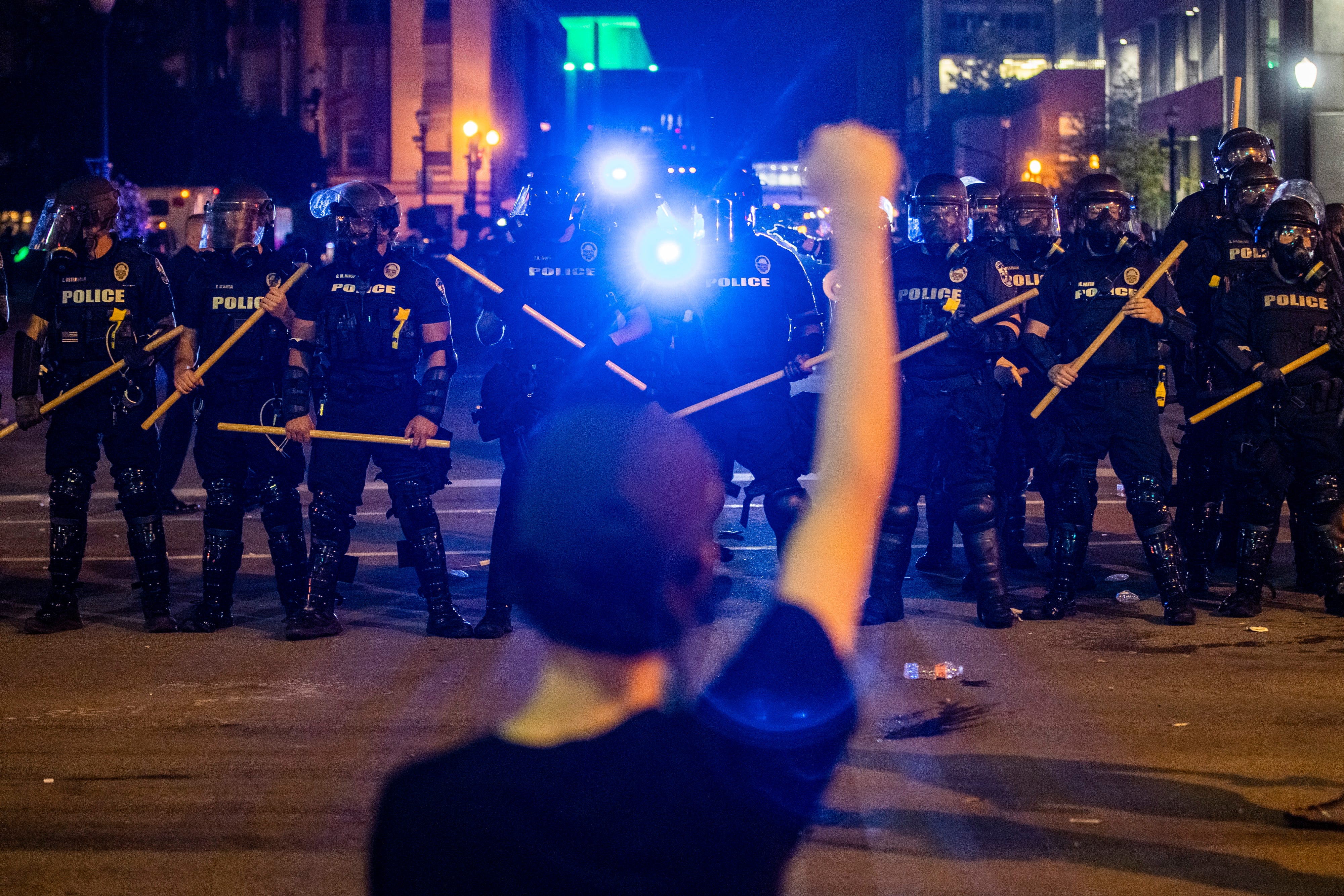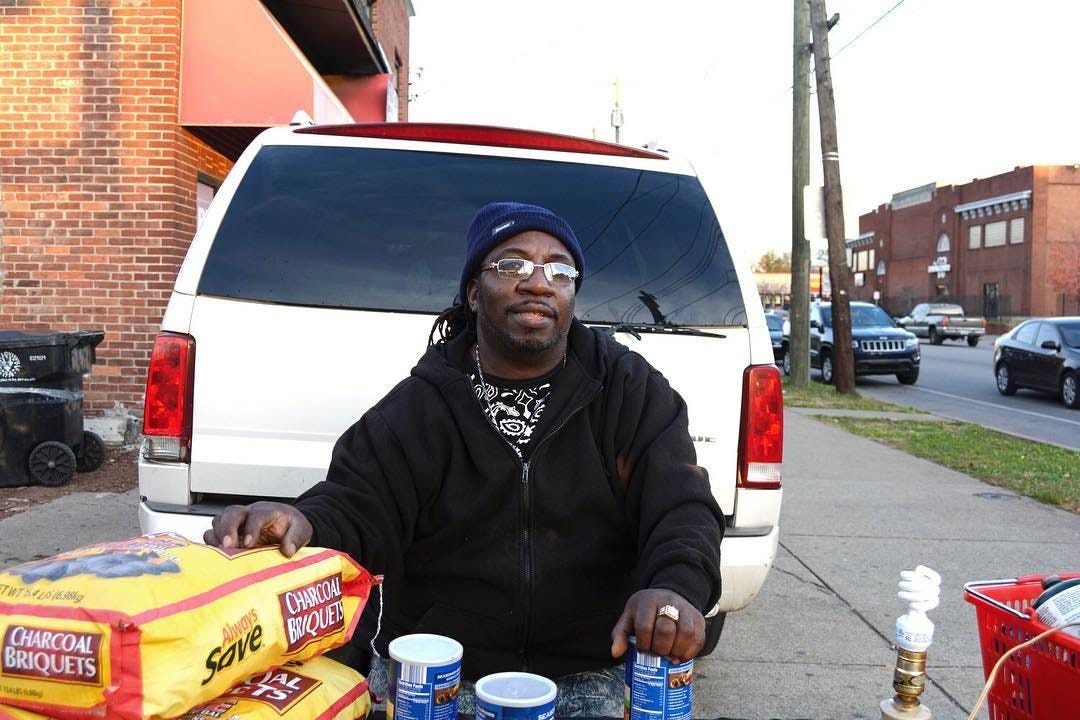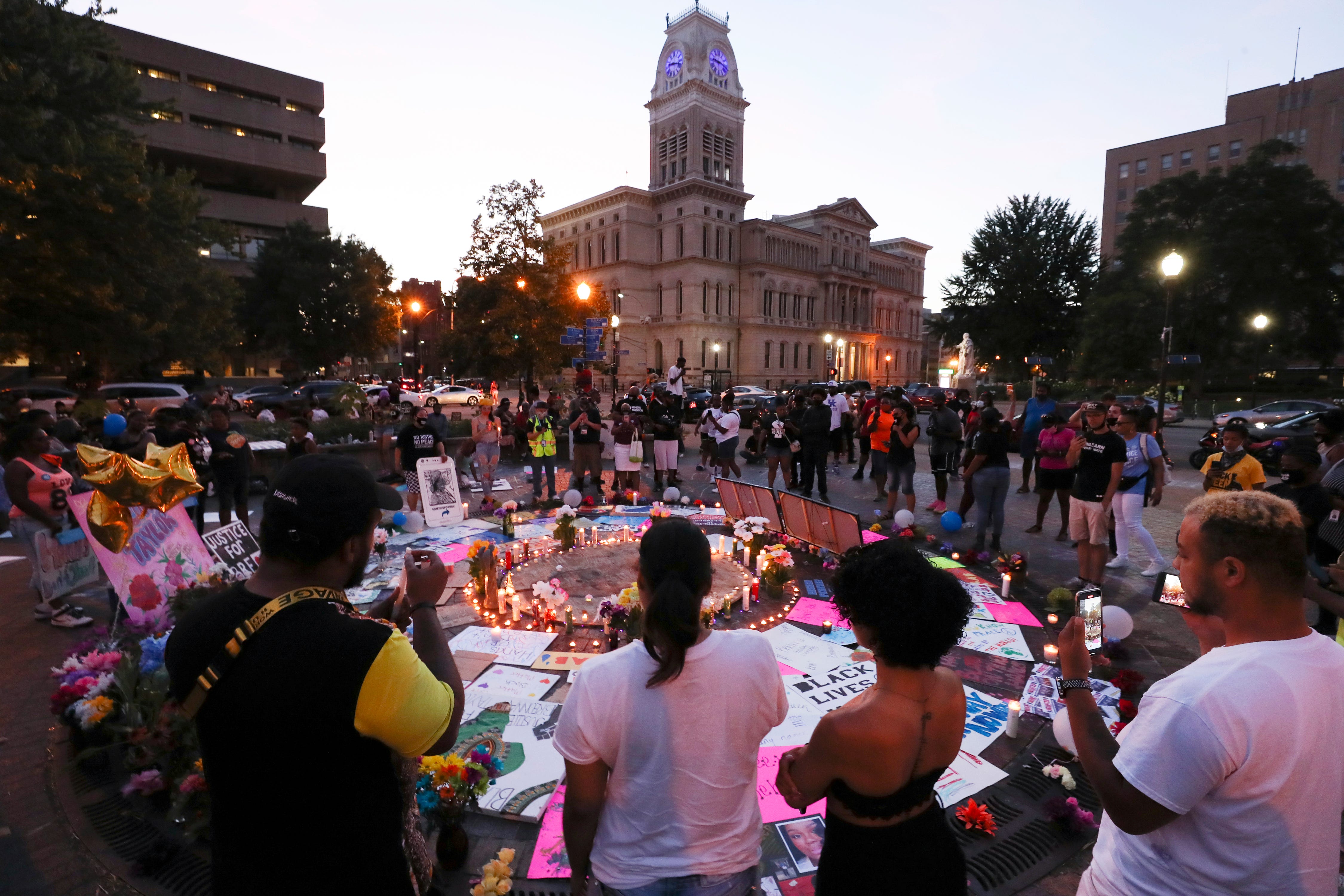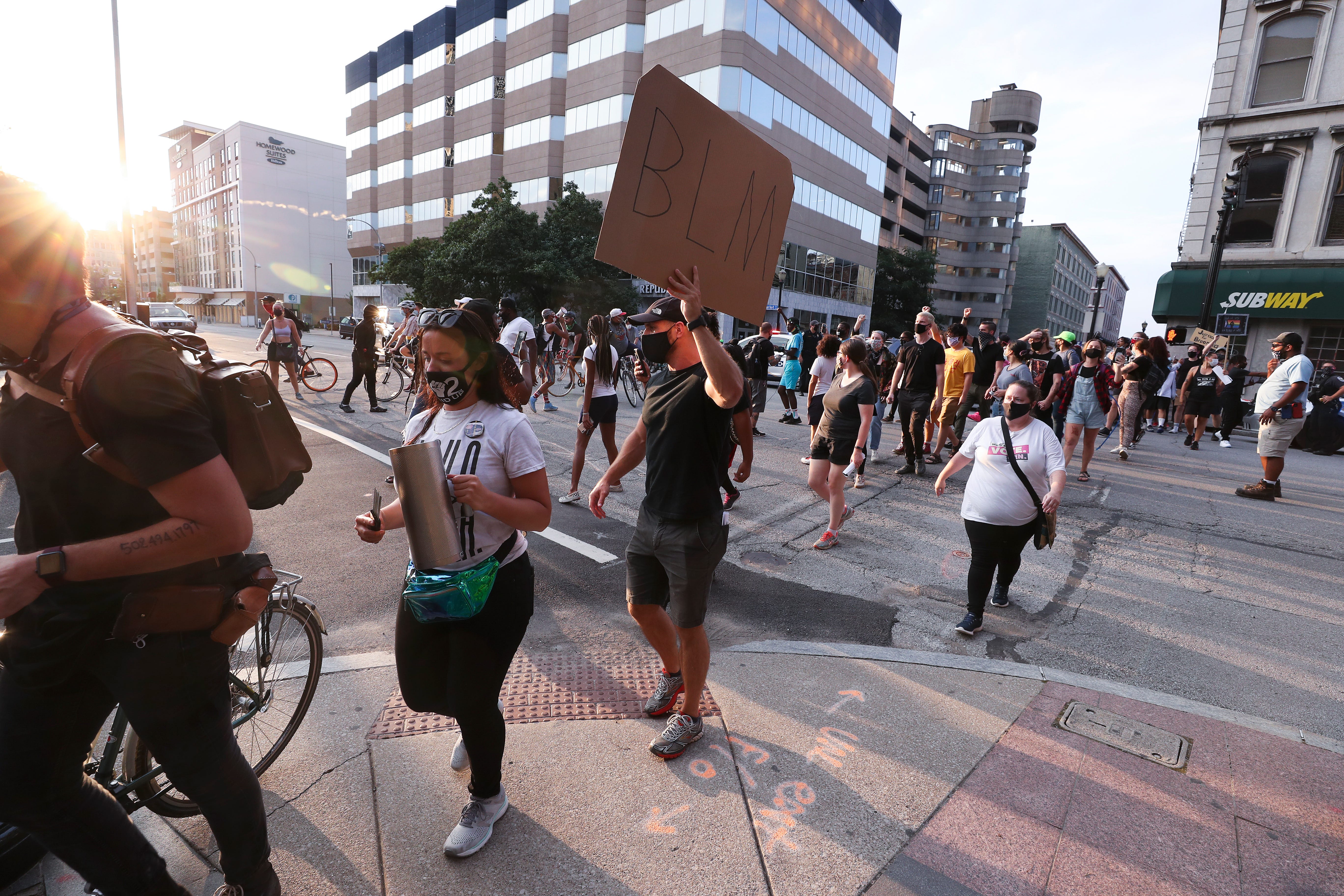LOUISVILLE, Ky. — The protesters always know what day it is.
Not the day of the week — those blend together — but the number of days it has been since May 28, when the Breonna Taylor protests began in Louisville. They say it aloud each night at Sixth and Jefferson, the de facto protest headquarters, as a rallying cry and motivating sentiment.
Today, Sept. 4, marks the 100th day of protests in Louisville.
Some days have seen small marches, with just a few dozen protesters carrying their message through downtown.
Others have been accented by huge demonstrations by local and national groups. Each day is fueled by the same goal: to achieve justice for Taylor, an unarmed Black woman killed by police in her apartment on March 13, and to promote racial justice.
'We are a different newsroom': How The Courier Journal has covered 100 days of protests
The past 100 days have run the gamut of experiences and emotions. Here’s a look back:
May 28: Protests begin
The night started peacefully with an impromptu gathering at the Indi's restaurant on West Broadway.
Audio of a frantic 911 call made by Kenneth Walker, Taylor's boyfriend, had just been released. And by late afternoon, someone had put the call out on Facebook: It was time to visibly demand justice for Taylor.
Though the protest started small, it quickly gained momentum as the group made its way downtown, eventually drawing hundreds to Sixth and Jefferson streets.
Police officers responded in riot gear. Protesters nearly overturned a prisoner transport vehicle. Shots rang out — hitting seven people. Officers released tear gas, and the intersection soon came to resemble a war zone.
The violence shocked people across the city. But for those who were there, it also served as a sign of why society needed to change.
"(Police) put us in a position where it's like we've got no choice," local rapper Montez Jones said the next morning. "We've got to do something because we can't keep allowing you to do this."

June 1: David McAtee is killed
David "YaYa" McAtee was cooking late-night barbecue when law enforcement agents pulled up to the corner of 26th Street and Broadway at 12:15 a.m., piling out of their vehicles to disperse a crowd out after curfew.

The curfew had taken effect at 9 p.m., after a night of vandalism saw people trash buildings, set fires and loot restaurants downtown. In an attempt to prevent further damage, Mayor Greg Fischer set a citywide curfew and called in the Kentucky National Guard.
And as agents swarmed the West End intersection shortly after midnight, chaos erupted.
Within three minutes, McAtee was shot and killed, hit by a single bullet to his chest in the doorway of his small restaurant.
Police contend McAtee fired first, which prompted two Louisville Metro Police officers and two National Guard members to return fire. State officials have since said the bullet that struck and killed McAtee was fired by a guard member.
"My son was a good son," McAtee's mother, Odessa Riley, said. "All he did on that barbecue corner is try to make a dollar for himself and his family. And they come along and they killed my son."
June 5: Breonna Taylor's birthday
Balloons, flowers and cards decorated Jefferson Square Park on what would have been Taylor's 27th birthday.
Under the sweltering summer sun, groups from across Louisville marched to the park, where they sang "Happy Birthday" and left messages for Taylor on a large white banner.
"You should be here," one message said. "You sparked such a powerful movement. Let's create a new world for you."
June 11: Breonna's Law passes
On the steps of Metro Hall, protesters gathered around a large TV screen, watching anxiously as Metro Council members met to discuss Breonna's Law.
It was the last time the 26-member council would be discussing a ban on no-knock warrants, which were used the night Taylor was shot and killed. And protesters hoped the legislators would vote their way, approving a measure they believe could prevent similar tragedies from happening.
Inside the meeting, Taylor's mother, Tamika Palmer, held her hands to her face in prayer as the council members cast their votes.
One by one the lawmakers voted yes.
"All Breonna wanted to do was save lives" as an emergency room technician, Palmer had told the council before the vote. "So it's important this law passes, because with that, she'll get to continue to do that, even in her death."
June 16: Growth of a protest

It was Tupac’s birthday, and protesters gathered at the park, listening to songs by the rap legend and planting a garden. The garden and a memorial to Taylor — which formed a ring of paintings and signs — have continued to be staples of the park.
More: How protests over Breonna Taylor's death have changed the political landscape
Protests continued that night, the 20th day, as more than 100 marchers gathered at the park at 8:30 p.m. and marched around the city, chants of "Breonna Taylor" echoing under overpasses.
June 25: Rally in Frankfort
For more than three hours, a bevy of speakers took to a podium and addressed more than 500 people on a sweltering day outside of the state Capitol at a rally organized by Until Freedom, a national social justice group, in Frankfort.
Palmer and Walker, spoke, as did actress Jada Pinkett Smith, attorney Ben Crump, and state Reps. Attica Scott and Charles Booker. Rapper Common delivered a poem with a clear message: Stand up for Black women.
Muhammad Ali’s cousin, Sean Ali Waddell, drew the loudest response of the day as he delivered an impassioned speech, demanding Kentucky Attorney General Daniel Cameron take action.
“Don’t you be on the wrong side of history,” he said.
June 27: More tragedy

Louisville police were on high alert.
A “patriot militia” was expected to face off with protesters downtown and officers stood ready to blockade the two groups. It was a confrontation that didn't happen, as the militia never showed.
Instead, tragedy did.
Tyler Gerth, a 27-year-old Louisville photographer and a supporter of the protests, was fatally shot and killed at Jefferson Square Park that night. Steven Lopez, a frequent participant in the protests, has been charged with Gerth's murder.
"Tyler was incredibly kind, tenderhearted and generous, holding deep convictions and faith," his family said.
Gerth, the godson of Courier Journal columnist Joe Gerth, was beloved by the protesters. His name joined Taylor’s and McAtee’s in chants.
June 29: Clark Memorial Bridge blocked
On a Monday morning, commuters on the Clark Memorial Bridge were met with a blocked road and a massive banner.
Black Lives Matter Louisville blocked passage across the Ohio River for more than three hours, hanging a huge sign with Taylor's name and face, reading: “They tried to bury me. They didn’t know I was a seed.”
The demonstration stopped all lanes of traffic, resulting in 20 towed vehicles and 43 arrests.
July 10: 'Fire, fire, gentrifier'
Mayor Fischer was at the podium, speaking at the ribbon-cutting of an apartment complex in Portland, when a group of protesters appeared behind him.
Interrupting his speech, the two dozen demonstrators held a banner that said, "Fire, Fire, Gentrifier," while chanting those words, expressing their anger about residents being displaced because of redevelopment efforts in Louisville.
Fischer walked away as the chants grew louder.
July 14: Daniel Cameron sit-in
It was a hot Tuesday afternoon when protesters took their calls for justice to Cameron's home.
In a demonstration organized by Until Freedom, more than 100 people marched from Ballard High School to Cameron's street.
The destination, for many participants, had remained a secret. But upon arrival, protesters formed lines in the grass, staging a sit-in as they were surrounded by dozens of police.
Within a few hours, 87 people were arrested.
July 16: 'Lean on me'
The sun was beginning to set as more than 100 protesters formed a ring around the Taylor memorial in Jefferson Square Park.
The memorial had been partially dismantled, and protesters were there to fix it with new paintings and signs.
Read this: 100 days of Breonna Taylor protests have gained attention. Now, Black leaders want investment
After revamping it, the group lit candles and chatted. Then, over a megaphone, a single protester began singing. A chorus of others chimed in: "Lean on me, when you're not strong."
July 24: Protest shuts down NuLu
It was a march, until it wasn't.
On a Friday, day 58, hundreds marched from the waterfront into NuLu, shutting down an entire block of Market Street. Suddenly, the march became a block party.
Within 30 minutes, protesters had set up long tables with food, a trampoline, artwork and games. They'd also erected a list of demands for business owners, including hiring more Black workers.
Police responded to the road block, and 76 protesters were arrested.
July 25: NFAC march
Two militias descended upon Louisville.
Three people were shot in Baxter Park that morning after a member of the Not F****** Around Coalition, a Black militia, unintentionally discharged a gun. Then, around 400 members of the NFAC, dressed head to toe in black, marched downtown. They met face to face with 50 members of the right-wing Three Percenters militia.
Police set up a barricade between the two heavily armed groups while hundreds observed.
The NFAC’s leader rallied more than 1,000 who had gathered downtown, demanding Cameron to “tell the truth” in regards to the Taylor case.
Aug. 9: LMPD cracks down on caravans

Protesters returned downtown in force after LMPD announced it would crack down on foot and vehicle protests.
Chanelle Helm, a member of Black Lives Matter Louisville, called the move an "intimidation factor" intended to silence demonstrations.
That night, more than 150 people marched through downtown in defiance of orders not to block traffic.
"The objective and the goal is to disrupt just as much as (police) disrupt people's lives," Helm said. "I don't think anybody is really bothered by them."
Aug. 25: 'BreonnaCon' and a march to Churchill
They called it a four-day "community convention."
There was a farmers market, workshops and a "Bre-B-Q." The events kicked off BreonnaCon. Until Freedom, which had temporarily relocated to Louisville, hosted the events that culminated in a gathering at South Central Park. From there, hundreds marched to the LMPD Training Academy and Churchill Downs. That's where police met them.
The march continued onto Central Avenue, where police put a stop to it. After a standoff, dozens sat in the streets and more than 60 were arrested.
Sept. 2: The 100th day approaches
Two protesters strolled around the circle at Jefferson Square Park, admiring the growth of the garden, planted months earlier. A sunflower stood several feet high, and they noted the tomato plants were ripening.
A group of 20 or 30 protesters gathered for a short march, no more than a few city blocks, around 9 p.m. As they began to walk, protest leader Chris Wells used the day’s number as a rallying cry.
“It’s day 98, and we’re still out here!”
Reach reporter Bailey Loosemore at bloosemore@courier-journal.com, 502-582-4646 or on Twitter @bloosemore. Reach reporter Hayes Gardner at hgardner@gannett.com or on Twitter @HayesGardner. Support strong local journalism by subscribing today: courier-journal.com/subscribe.